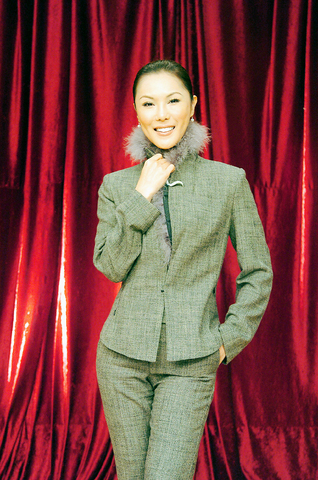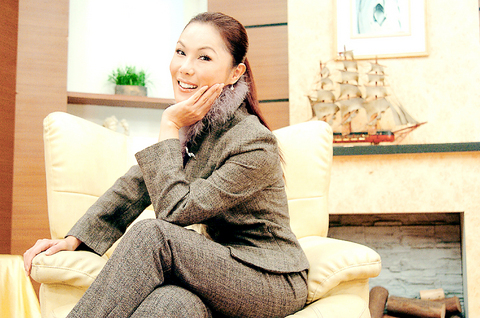As the most instantly recognizable host of the Eastern Media Group's Shopping Channel (東森購物), Li Jing's face is beamed into millions of households seven days a week. And since she first stepped in front the camera to peddle jars of dried mushrooms and other popular shopping channel products, she has become a phenomenon.While Li Jing has no plans to relinquish her title of "Queen of the Shopping Channel" anytime in the near future, she will be branching out in the coming months.
The first glimpse the public will get of the "new" Li Jing will be on Star TV, when she takes center stage and hosts an hour-long talk show based on the hugely popular Oprah Winfrey Show.

Set to debut on Star's variety- show channel sometime in the coming months, the yet-untitled show will, according to its host, offer something for everyone and be filled with humor, gossip and plenty of real-life drama.

PHOTOS: GEORGE TSORNG, TAIPEI TIMES
"I get a lot offers to shoot programs, but I like to protect myself and be careful before saying `yes' to any offer," she said. "The new show will be funny and cover a lot of diverse and interesting themes and topics."
Regardless of any career move Li Jing may choose to take in the future some things will, no doubt, remain the same.
Over the past five years Li Jing (利菁) has became one of Taiwan's most talked-about and pursued celebrities. The paparazzi and gossip-column journalists follow her every move, and hardly a day goes by without her name appearing in at least one of the nation's dailies or glossy gossip weeklies. The nation is now so accustomed to its exceptional television host that gossip column writers and cable news networks will continue to be more than happy to devote column inches and airtime to the "Queen."
She has her own fan club, she receives scores of letters offering praise and encouragement in any given week, and whenever she steps outside she's mobbed by throngs of adoring fans eager to catch a glimpse of, or cadge an autograph from, "The Queen of the Shopping Channel."
Like so many before her, Li Jing dabbled in several fields before shooting to stardom. She was the spokesperson for a popular brand of cosmetics; she was a dancer; she was a choreographer; she appeared in television soap operas, and she also tried her hand at singing, though she readily admits today that she "doesn't have very good vocal chords."
But what really sets the witty and self-assured television host apart from her many peers is the fact that she used to be a he.
"When I was young I knew everything was wrong. I had the physical desire to be a girl in my heart because I knew I wasn't like the other boys," said Li Jing. "Although I had both male and female thoughts, it was my feminine hormones that had a stronger influence on the way I acted. I hated being touched by the boys and I felt alienated."
Li Jing physically and officially became a female shortly before entering the English Literature Department of Suchow University at age 19. Not everybody, however, had been forewarned. Her freshman year at university proved a grueling and uncomfortable experience.
"I obviously looked like a women, but the [university's] paperwork still said I was a man. It was such a shock that I tried to kill myself," she said.
It was while studying at university that Li Jing made her first tentative steps to superstardom by taking a part-time job as a model. By the time she graduated from university, Li Jing had already become a popular figure in the fashion industry.
In order to escape the glare of publicity that has followed her since leaving university and becoming a household name, Li Jing travels to Paris and the US at least twice a year to purchase the latest fashions and enjoy brief respites of anonymity.
She might enjoy being away from the limelight for short periods of time, but when she returns to Taiwan it is now impossible for Li Jing to escape the
realities of who she is.
Mobbed by fans when leaving the studio or while grocery shopping near her home in Hsichih, she now enjoys movie-star-like status and receives scores of letters from her army of devoted fans on a daily basis.
"I do get mail from men telling me how much they love me, but most of my fan mail comes from women," she said. "They write to encourage me or tell me how much they admire me or to ask about the clothes they've seen me wearing on television and ask where they can buy them and so on."
Not everyone is as gracious or as adoring as her doting fans. Like many well-known personalities, Li Jing also receives her fair share of hate mail.
The television networks team of censors does its best to monitor the contents of her fan mail before it arrives on her desk, but malicious mail does, on occassion, sneak through.
"The supervisor censors the mail and checks that it's authentic before giving it to me, but I do get rude letters," she said. "Most of them say things like `the Queen is not so good now,' and so on. I don't think they come from people who genuinely hate me. I think they come from people who are simply jealous."
It's not only her critics who have an ax to grind with the "Queen of the Shopping Channel," however. Her outspoken disregard for some of her younger peers has made her a target for a certain element within the cutthroat, often underhanded and far from glamorous business in which she works.
"You see a lot of newcomers who are too young and have no experience. They think [hosting a show] is easy and that all you have to do is look nice," said Li Jing. "[A few] of them could be good hosts, but they don't know how to conduct themselves. Sending [erroneous] letters to the media purely for spite is certainly not something I consider to be professional
behavior."
Earlier this week, local media was awash with photographs of Li Jing cavorting on a bed with actor and comedian Hsu Hsiao-shun (許效舜). The fact that they were rehearsing a scene for the television series Beauty Clinic (好美麗診所) didn't matter. The local gossip columns and cable news channels were flooded with speculative tittle-tattle concerning Li Jing's sexual preferences long before the director had said, "cut."
"You have to get used to [being the focus of unwarranted attention]. It does hurt sometimes, but I don't look at these stories," she said. "Anyway, I think I'd be more upset if people didn't write about me."

Oct. 21 to Oct. 27 Sanbanqiao Cemetery (三板橋) was once reserved for prominent Japanese residents of Taipei, including former governor-general Motojiro Akashi, who died in Japan in 1919 but requested to be buried in Taiwan. Akashi may have reconsidered his decision if he had known that by the 1980s, his grave had been overrun by the city’s largest illegal settlement, which contained more than 1,000 households and a bustling market with around 170 stalls. Fans of Taiwan New Cinema would recognize the slum, as it was featured in several of director Wan Jen’s (萬仁) films about Taipei’s disadvantaged, including The Sandwich

“Wish You Luck is not just a culinary experience, it’s a continuation of our cultural tradition,” says James Vuong (王豪豐), owner of the Daan District (大安) Hong Kong diner. On every corner of Kowloon, diners pack shoulder-to-shoulder over strong brews of Hong-Kong-style milk tea, chowing down on French Toast and Cantonese noodles. Hong Kong’s ubiquitous diner-style teahouses, known as chachaanteng (茶餐廳), have been a cultural staple of the city since the 1950s. “They play an essential role in the daily lives of Hongkongers,” says Vuong. Wish You Luck (祝您行運) offers that same vibrant melting pot of culture and cuisine. In

Much noise has been made lately on X (Twitter), where posters both famed and not have contended that Taiwan is stupid for eliminating nuclear power, which, the comments imply, is necessary to provide the nation with power in the event of a blockade. This widely circulated claim, typically made by nuclear power proponents, is rank nonsense. In 2021, Ian Easton, an expert on Taiwan’s defenses and the plans of the People’s Liberation Army (PLA) to break them, discussed the targeting of nuclear power plants in wartime (“Ian Easton On Taiwan: Are Taiwan’s nuclear plants safe from Beijing?”, April 12, 2021). The

Artificial intelligence could help reduce some of the most contentious culture war divisions through a mediation process, researchers say. Experts say a system that can create group statements that reflect majority and minority views is able to help people find common ground. Chris Summerfield, a co-author of the research from the University of Oxford, who worked at Google DeepMind at the time the study was conducted, said the AI tool could have multiple purposes. “What I would like to see it used for is to give political leaders ... a better sense of what people ... really think,” he said, noting surveys gave